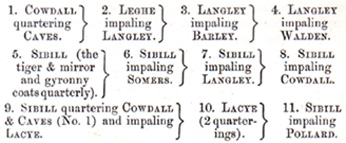|
family, a once flourishing Kentish house, who built the mansion of Little
Mote, and eventually disappeared off the face of the earth in the time of
James I.
These carvings are all that remain of the heraldic decoration
which in Philipot’s time was to be seen in the house; and I have
considered them sufficiently interesting to be worthy of an illustration to
a large scale, as well as being shewn in the elevation of the fire-place.
Philipot says that these arms, viz., "a tyger viewing himself in a
mirrour or spigel," were then existing, "both carved and embossed
very anciently in wood, as likewise represented to the view in old coloured
glass," and also that the arms of Cowdale (whose heiress married a
Sybill), viz., "argent, a chevron gules between three bulls’ heads
cabosed sable, both empailed and quartered with this family, are yet visible
in many places of the house." These words are corroborated in a very
interesting manner by some anonymous notes in Stowe MS. 620 in the British
Museum which I have recently discovered. On folio 25 (pencil number) are
eleven roughly-tricked shields of
|
|
arms shewing various quarterings and impalements with the names of the respective alliances, described as being
"In the glasse windowes of the p’lour of Mr. Bosviles house at
Enysforde in Kent 7 Septemb’ 1593." The shields are arranged in the
following order :—

That "Mr. Bosviles house" was Little Mote is clear from the fact
that he inherited it by his marriage with the heiress Elizabeth Sybill, and
used it as his residence. Owing to the (traditional) destruction of the
house by fire some time in the eighteenth century it is impossible to say in
what room
|